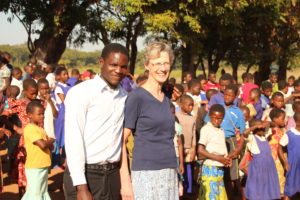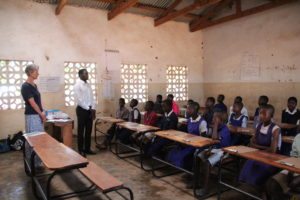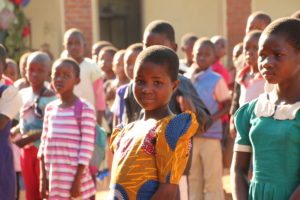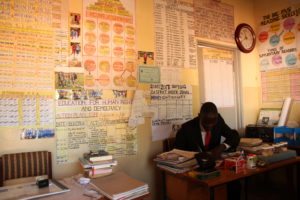We woke up bright and early on Monday morning so that we could take Trudi to her first day as a guest science teacher. Trudi is taking a month off from her research job with a pharmaceutical company so that she can provide hands on science lessons and experiments for students in the Sakata region. Primary school in Malawi is rarely interactive. The classes are so crowded, often 40 or more students in every room, that lessons are very teacher centric, by necessity. Trudi will be working with 20 students every day and has provided learning materials so that every student that she works with will not only be able to watch her conduct experiments, but will be able to conduct their own experiments along with her. VIP Stalwart Sydney Chikelema will be working with Trudi as her assistant and translator. In preparation for her lessons on the human body, Trudi got very creative and made a “working” model of a human lung out of old plastic bottles, balloons and rubber bands. Trudi also spent hours designing interactive lessons on chromatography, sound waves, water chemistry and the mysteries of science! Trudi will be working with students from three schools over the next three weeks, but she is spending this week with the students of Chimpeni School.
In preparation for her lessons on the human body, Trudi got very creative and made a “working” model of a human lung out of old plastic bottles, balloons and rubber bands. Trudi also spent hours designing interactive lessons on chromatography, sound waves, water chemistry and the mysteries of science! Trudi will be working with students from three schools over the next three weeks, but she is spending this week with the students of Chimpeni School.
Chimpeni School has a very interesting history, beginning with a British family called the Thorneycrofts who relocated to Malawi following the First World War. The patriarch of the family was fond of carrying a large machete around with him on his waist to cut through the Malawian bush and he was given the nickname “Chimpeni” by the local Malawians who worked on his estate. In Chichewa Chimpeni translates to “big knife.” Thorneycroft liked the nickname and his family and their descendants have adopted it as an honorable title. For the rest of the 20th century not much changed on the Chimpeni estate and the surrounding villages. The Chimpeni’s grew and sold tobacco, raised cattle and livestock and grew cash crops, while employing many of the Malawians who lived in the surrounding villages.
But then in 2010 things drastically changed. The people in the villagers surrounding the Chimpeni’s land came to the new patriarch of the Chimpeni family (Colin Thorneycroft) with a very unusual request. There were no primary schools close enough for the children of the villages to walk to and the villagers asked Chimpeni for land to build a primary school so that their children could finally go to school. Chimpeni was sympathetic, but was also taken aback and asked them how they were possibly going to build a school. “You have no money or resources to carry out such a large undertaking” he told them. But the villagers replied that they had partners from America who had just come to Sakata, and together they could build the school. Those American partners were VIP.
Chimpeni was intrigued by this new group and made a deal with the villagers. He would give them a piece of land for one year. And if the villagers were able to do something with the land, he agreed that they could keep it forever to build and house a school. The villagers told VIP of Chimpeni’s offer and we got to work right away. We brought out a government surveyor and met with Chimpeni to find the right location to begin building the school. Chimpeni himself walked with VIP staff and government surveyors and demarcated the exact boundaries of the future school. Once the land was chosen VIP was able to quickly build the first school block and the school was officially opened. All it needed now was a name. And that was supplied by the villagers themselves. Knowing how generous Chimpeni’s offer had been, they named the school the Chimpeni School in honor of the family who had made it all possible.
Chimpeni now became even more involved in the project. A big force behind this was his wife Jane. Jane has a huge heart and a great love for children and she was very excited by the idea of her family building a school for a group of children who were desperately underserved. Together, the family raised the funds to build a second school block. VIP then added a teachers’ house, which was quickly followed by another school block built by Chimpeni. We went back and forth like this until at present the school has classrooms for grades 1-7 with five teacher houses on site. By the end of the summer classrooms will be built to house grade 8 and the school will be a full-fledged primary school!
But a school is only as good as the teacher’s that work there, and Chimpeni School is very fortunate in that regard. As we prepared for Trudi’s stay at the school we met with head teacher Willie Chilema, who proudly told us that in a recent government assessment of all 35 primary schools in the Zomba district, the Chimpeni School came out as the number one ranked school! Things will be getting even better for the school, as this summer VIP will be adding solar panels to all 5 teachers’ houses, to both of the new 8th grade classrooms and to one of the 7th grade classrooms. These solar panels will allow the school to retain their highly competent teachers and to attract even more top teaching talent in the years ahead. The solar panels will also power lights in three classrooms, so as students prepare for the examinations that will determine what secondary school they are placed in, they can continue to study with their teachers past 6 o’clock when the sun goes down.
Things will be getting even better for the school, as this summer VIP will be adding solar panels to all 5 teachers’ houses, to both of the new 8th grade classrooms and to one of the 7th grade classrooms. These solar panels will allow the school to retain their highly competent teachers and to attract even more top teaching talent in the years ahead. The solar panels will also power lights in three classrooms, so as students prepare for the examinations that will determine what secondary school they are placed in, they can continue to study with their teachers past 6 o’clock when the sun goes down.
Together with educators and people with a passion for education like Trudi, Willie, Chimpeni and Jane, VIP is providing the children of Sakata with a future that was unthinkable only a few short years ago!


Education is key! Amazing to see a school come together like that, involving so many different players and partners from all different levels- local communities, private individuals/families, NGOs, government- something not easily done in development. When’s the preschool being added?? 😉
https://www.nyasatimes.com/mutharika-say-malawi-shares-world-bank-vision-early-child-development/
Justin. Thank you for your remarkable stories and for making the special work of VIP more tangible for those who have not had the extreme pleasure of being there themselves. God bless!
thanks again Justin. i look forward every day to reading what you write and how things are going over there. God bless all of you.